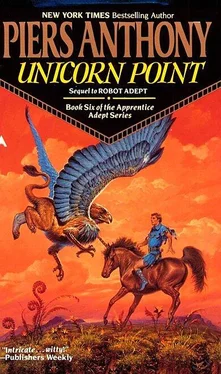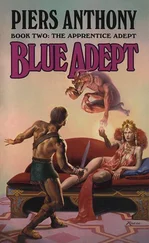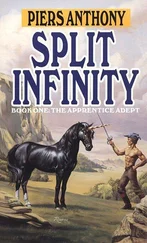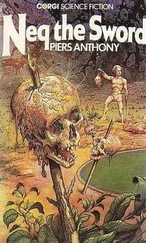Piers Anthony - Unicorn Point
Здесь есть возможность читать онлайн «Piers Anthony - Unicorn Point» весь текст электронной книги совершенно бесплатно (целиком полную версию без сокращений). В некоторых случаях можно слушать аудио, скачать через торрент в формате fb2 и присутствует краткое содержание. Год выпуска: 1989, ISBN: 1989, Издательство: Ace, Жанр: Старинная литература, на английском языке. Описание произведения, (предисловие) а так же отзывы посетителей доступны на портале библиотеки ЛибКат.
- Название:Unicorn Point
- Автор:
- Издательство:Ace
- Жанр:
- Год:1989
- ISBN:9780441845637
- Рейтинг книги:3 / 5. Голосов: 1
-
Избранное:Добавить в избранное
- Отзывы:
-
Ваша оценка:
- 60
- 1
- 2
- 3
- 4
- 5
Unicorn Point: краткое содержание, описание и аннотация
Предлагаем к чтению аннотацию, описание, краткое содержание или предисловие (зависит от того, что написал сам автор книги «Unicorn Point»). Если вы не нашли необходимую информацию о книге — напишите в комментариях, мы постараемся отыскать её.
Unicorn Point — читать онлайн бесплатно полную книгу (весь текст) целиком
Ниже представлен текст книги, разбитый по страницам. Система сохранения места последней прочитанной страницы, позволяет с удобством читать онлайн бесплатно книгу «Unicorn Point», без необходимости каждый раз заново искать на чём Вы остановились. Поставьте закладку, и сможете в любой момент перейти на страницу, на которой закончили чтение.
Интервал:
Закладка:
“It will be a while before I meet with Tan,” he said. “If you would like something to eat first—”
“I want to play a game with you. Uncle,” she said.
“Such as piggy-back riding?”
“No piggy-bank riding! A real game!”
“Oh, you mean a Game!” he said, understanding.
“A Game,” she agreed.
“Some of those games are unsuitable for a person your age.”
“Yes,” she said zestfully.
“But your mother would smite me if I played one of those with you.”
Nepe frowned, acknowledging the truth of this concern.
“But I know the difrence. We’ll play a suitble game.”
“Very well.” He guided her to the Game Annex. They came to a Game Console. This was set up with screens on either side, for the two players. He fetched a bench for Nepe to stand on, and lifted her up so that she could supervise her screen. “Do you know how to do this?” he asked.
“Natchly,” she said. “Get to your side.” Mach went to his side. He knew that Bane and Agape had increasing concern about the child, who seemed to be a slow learner. She did not seem slow to him, but he realized that he had little proper basis for comparison. She seemed to be fully as alert as and somewhat more expressive than his son Flach.
But that of course was the problem. Flach was not keeping pace with either fully human or unicorn children his age. He spoke more slowly, and lacked interest in academic pursuits, and had mastered only two of the three forms expected of a unicorn. They had hoped he would go beyond the ordinary in both the human and unicorn respects, and for a time it had seemed that he would, but then progress had slowed. That was why Mach had intercepted Stile in Phaze—to no avail, as it turned out, because Stile had refused to acknowledge that the problem existed. Stile liked his grandson, without doubt, and that went far toward mitigating his early objection to the unusual marriages of Mach and Bane, but Mach had not expected that to distort his judgment about the boy’s progress.
Could it be overcompensation on Stile’s part, or advancing age? Technically Flach was the child of Bane, because Bane’s body had generated him; genetics took little note of which mind occupied the body at the time. Thus Mach’s son was Stile’s grandson, and no one debated this, but the question always lingered in the background: was this entirely legitimate? Stile might compensate for that doubt by seeing no evil in the boy. But Mach had too high a regard for the ability and character of the man to be satisfied with this explanation. Stile was on the other side, and he was clever; his optimism about the boy might be a mere mask, preventing acknowledgment of a developing liability in the assets of his enemy. But how could Stile profit by such a pose? Mach had become the leading Adept of Phaze, thanks to the input of the Book of Magic, but he never deceived himself that he was the smartest person. He suspected that Stile was playing a game whose nature he hardly understood.
“Are you going to choose. Uncle?” Nepe asked. Mach glanced at his grid. As always, it showed the four major categories across the top: 1. PHYSICAL 2. MENTAL 3. CHANCE 4. ARTS, and four types down the left side: A. NAKED B. TOOL C. MACHINE D. ANIMALS. He had the letters. Quickly he touched A. NAKED. Here in Proton the word had no social significance, as all serf’s were naked; it simply meant that no tools, machines or animals would be used. He felt this was the safest course for a game with a child, because it eliminated most of the most complicated ones.
Immediately the new grid formed: 2A. NAKED MENTAL. He had not needed to worry about inappropriate tools; her choice of MENTAL had negated most of that. Across the top were 5. SOCIAL 6. POWER 7. MATH 8. HUMOR, and down the side were E. INFORMATION F. MEMORY G. RIDDLE H. MANIPULATION. He had the numbers this time, so selected 8. HUMOR.
She had chosen as quickly as he, and the third grid appeared: HUMRUS MANPLASHUN. Good enough; he should not get into much trouble there. The point of this Game was to satisfy Nepe, not to win or lose. Then he glanced back at the grid heading, startled, but the title had already faded. Had he imagined Nepe’s language there? How could that happen to a robot? He looked at the child, but she had assumed a mask of complete innocence. They set up the final grid, filling in improbable choices relating to illogic and jokes. Nepe’s choices evinced a proclivity for naughtiness that would have distressed her mother; apparently the child felt free to express herself more openly in the company of her uncle.
They played the grid, and the final choice of games was made: STRUCTURED LYING.
Mach shook his head. “Your mother—”
“Isn’t playing,” the child said quickly. True. So Nepe had her way, and could now tell lies with impunity. This variant, as structured, required that each make a statement, while the other challenged any lie. If a lie was accepted as valid, or a true statement challenged as a lie, a point was scored by the originator. If the statement was called correctly, the point went to the challenger. The trick was to cause the opponent to challenge some seemingly outrageous but actually accurate statement. A lead of two points decided the game.
Mach made the first statement. He was not very good at lying, because it was foreign to both his training and his robotic programming; a good lie required imagination of the quality only a living brain could achieve. Fortunately his opponent was a child, and a childish example would suffice. He presented one of the classic ancient riddles.
“I know of a chamber filled with gold. The gold is wrapped in a silken shroud, and set in a transparent liquid, which is sealed in a container that has no doors or windows or openings at all. Yet—“
“An egg,” Nepe said, not waiting for him to finish. “So it is true.”
“You’ve heard it before,” Mach said, chagrined to be thus readily bested.
“No, I guessed. I figured you’d start with something pretty elmentry.”
Elementary: indeed he had. Still, Nepe did not strike him as even minimally retarded. She had made a swift and accurate connection, after correctly analyzing his strategy. She showed potential for master gamesmanship. Now it was her turn. “The man rode on the horse, and yet he walked beside it,” she said.
Mach pondered that. Surely it was a trick statement, appearing impossible, just as his riddle of the egg was supposed to be. But what was the rationale that made it true? Either the man was on the horse, or he walked beside it. Unless there were two selves in the two frames, Phaze and Proton, with one self riding and the other walking. But that would require alternate selves of me horse, too, and mat made four creatures in all. The Game Computer was unlikely to allow so farfetched an interpretation; structured humor had to be narrowly defined.
One man, one horse: how could it be? Mach was somehow sure it could be, but his robotic logic did not fathom it. “That’s a lie,” he said.
Nepe smiled, as he had known she would. “Yeti is the name of the dog,” she said. “That one’s as old as your egg.”
Mach groaned, seeing it. Not “yet he” but “Yeti,” sounding the same when spoken. An interpretation that was valid in humor, if not elsewhere. He had indeed blown it.
“So did I win, huh?” she inquired joyfully.
“You won,” he agreed.
“Gee—my first and last,” she said with a mixed smile. “Thank you. Uncle.”
Her last victory? He doubted it! He wished Flach had her ready wit.
They were at the Tan Adept’s office precisely on time. Serfs were always punctual when dealing with Citizens, because a rapid process of selection eliminated all who were not. The normal manner of elimination was firing, which meant that the serf had to leave the planet unless he could find a new employer—a forlorn hope. But there were few questions when serfs simply disappeared, though all knew this could not hap pen by the serfs choice. No serf ever gave any Citizen reason for annoyance if it was possible to avoid it. As it happened, Mach had given Citizen Tan reason for annoyance, and Fleta (in Agape’s body) had given him reason for rage. But they had survived because Mach was an essential resource and Agape was under his protection. Bane (in Mach’s body) and Agape called themselves married, but this was an affectation; there was no marriage among serfs, merely an informal tolerance of a continuing association. If the closeness of Bane and Agape ever abated, she would have to get offplanet in a hurry, for her protection would be gone. There seemed to be no danger of any separation, considering the presence of Nepe; nevertheless. Agape normally remained well clear of Citizen Tan.
Читать дальшеИнтервал:
Закладка:
Похожие книги на «Unicorn Point»
Представляем Вашему вниманию похожие книги на «Unicorn Point» списком для выбора. Мы отобрали схожую по названию и смыслу литературу в надежде предоставить читателям больше вариантов отыскать новые, интересные, ещё непрочитанные произведения.
Обсуждение, отзывы о книге «Unicorn Point» и просто собственные мнения читателей. Оставьте ваши комментарии, напишите, что Вы думаете о произведении, его смысле или главных героях. Укажите что конкретно понравилось, а что нет, и почему Вы так считаете.











